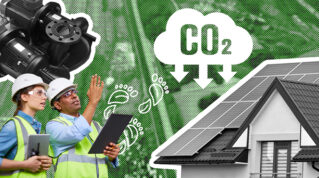As world leaders meet for COP26 in Glasgow to discuss the actions to meet the goals of the Paris climate agreement, we know education has a key role to play in creating more sustainable futures. But it can often be difficult for students and teachers to make the space and time to question the systems and structures that promote unsustainable living.
We have been working with partners and over 200 teachers and young people over the past year. Our aim has been to find out what role they see education playing in helping to achieve environmental sustainability, and to identify priority actions for the sector itself.
On Monday, we launched a Manifesto for Education for Environmental Sustainability based on their ideas and perspectives. The manifesto calls for action in the classroom, the school, community and at policy level to achieve education for environmental sustainability for all.
The first step to enabling action is to remove barriers. According to our participants, these presently include limited funding, curriculum and exam pressures, and lack of recognition for work on environmental sustainability.
The teachers and young people we spoke with see sustainability as a process of care and repair of the environment, dealing with social and environmental injustices and prioritising future generations.
Sadly, they see little space for it within the secondary school curriculum. As one astute young participant commented, “Curriculum education is very limited in terms of environmental sustainability. The onus is often put on teachers or senior students to lead clubs to hone outside interest. Right now,” she added, “we tend to only learn the theory about climate change and environment, confined to classes like geography and science.”
Young people and teachers want greater knowledge to inform their actions
And, perhaps worse still, they don’t believe environmental sustainability is valued in broader educational decision-making and accountability regimes. A teacher participant summed it up well: “Sustainability needs to be a ‘must’… and, at the moment, it isn’t an inspection must! Even in Scotland, where sustainability is part of teacher ed.’
But while some participants were critical of accountability systems, they saw them as influential in determining what happens within schools. By and large, their frustration was that they saw curriculum, assessment and inspection as places where sustainability could and should be valued.
However, our participants weren’t reliant on external forces to motivate them. They had plenty of ideas for action up and down the education system, which inform the 2021 BERA research commission manifesto.
In class, students and teachers wanted more time and space to learn about climate change and environmental sustainability across the curriculum, with professional development for teachers and sustainable practices implemented. That is, they want teaching and learning for sustainability.
At the whole-school level, teachers and young people call for greater leadership in sustainability. They want actions for sustainability within schools to be tracked and rewarded, and see student voice and agency as integral to making sustainable decisions on purchasing, transport and estates.
They also want to gain credit for the sustainability work they do in the wider community, which currently tends to go unrecognised. The idea of a no-cost, externally accredited award for sustainability for students and teachers was particularly popular. And conversely, they want their schools to act as local hubs where people from across the community can take part in and lead education and activities and build networks for environmental action.
Finally, at the policy level, they call for a co-ordinated review of the secondary school curriculum. Its aim: to identify ways to foreground and value sustainability regardless of the subjects students elect to study. Importantly, they want to work with policy makers to identify ways that sustainability can feature in existing accountability regimes and policies. They see collective, equitable action as essential to positive problem-solving.
The process of developing this manifesto has highlighted a key problem: that education for environmental sustainability is currently limited by choice, of subject and of school. Instead, young people and teachers alike want greater breadth and depth of knowledge to inform their actions.
And for that, sustainability needs to be more than an add-on, but a core value and objective of every part of our education system.














Your thoughts